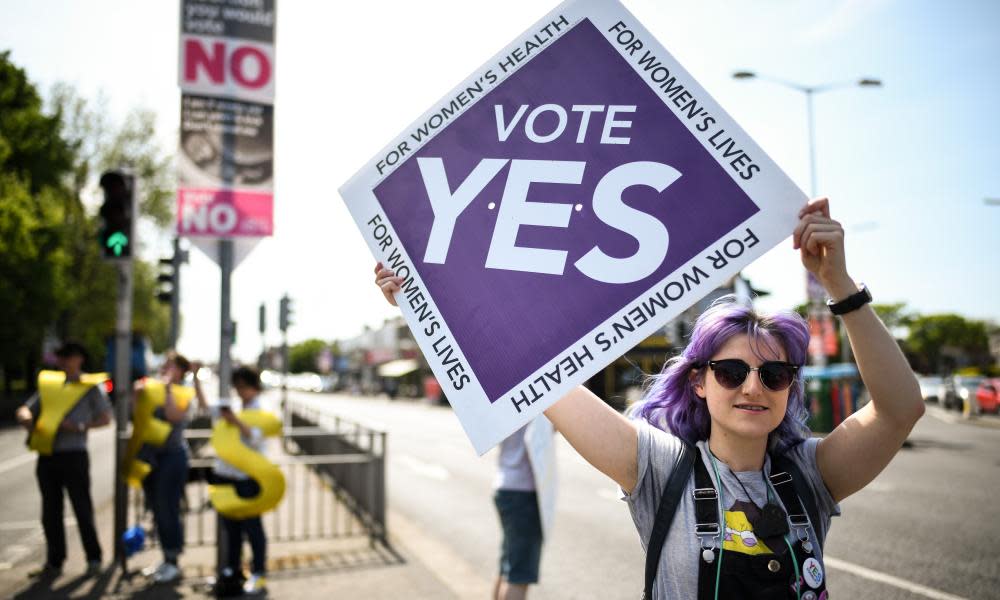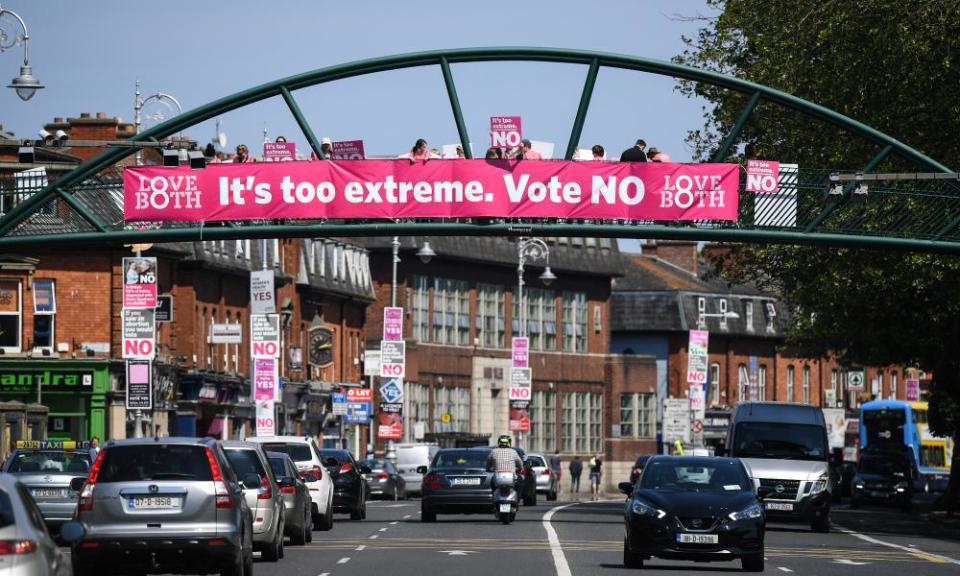Support for Ireland's abortion ban appears to have melted away

Ruth Shaw was one of hundreds, perhaps thousands of Irish voters who flew home or stayed home, cancelled holidays or came back early, so they could cast a vote to end Ireland’s decades-old ban on abortion.
They thought their votes might be needed to tip the balance. In the end, though, they joined what seems to be an unforeseen landslide of support for change.
The first exit poll, from the Irish Times/Ipsos MRBI, showed that Dublin, as expected, had voted overwhelmingly for yes. But so too did rural areas, which the no vote had counted on to form a bulwark of conservative support for Ireland’s restrictive status quo.
“It’s great for this country, we need to step into the next century,” said teacher Caroline Ryan, one of the first to vote but confident even at 7am that the repeal would pass. “Every other country in Europe has access to abortion.”
The vote was a reminder, she said, of the church’s loosening grip on a country where a series of scandals, involving child abuse and mistreatment of pregnant, unmarried women and their children, have hugely undermined the clergy’s authority. “Women have been treated so badly in this country by the Catholic church,” she added.
Voters had to help Ireland decide whether to keep a clause in its constitution, known as the 8th amendment.
Since 1983, it had put the “right to life of the unborn” on an equal status with the life of a pregnant woman, underpinning a near-total ban on abortion in Ireland, even in cases of rape, incest or fatal foetal abnormality. It is one of the strictest set of rules in the western world.
For Shaw who, along with 20 family and friends had flights lined up to go to a wedding in New York when the date was set, there was no question about what to do.
“We changed our flights,” she said. “It’s really important; I’ve got two daughters.” So at 6.55am she was waiting with nine-year-old Simi outside Our Lady’s Clonskeagh Parish secondary school, second in line to cast her vote before heading to the airport.
On a day of glorious sunshine and heightened emotions, polling stations across Ireland reported high turnouts for a ballot that politicians and campaigners agreed would settle a hugely emotional issue for at least a generation.
Polls narrowed in the run-up to voting, with the outcome widely expected to depend on the one in six voters who were still undecided on the eve of the poll. Many in the no camp were convinced they had a groundswell of quiet support.
“So many no voters are shy,” said Fidelma, 45, a Dubliner who said she was wearing a no badge for the first time and was surprised to find more than half her office of 10 people offering her support.
She had kept her views private until the day of the referendum because there was so much social pressure in the capital to support a repeal. “People make us feel like we are backwards and don’t count,” she said.

At the ballot box, ultimately, there were not enough no voters to count. Two thirds of men, and an even higher propotion of women, opted for change, according to the Irish Times.
Among the young in particular, the vote was overwhelmingly in favour of ending the ban. Nearly nine out of 10 voters between 18 and 24 voted yes, the Irish Times exit poll found.
Riodhna Mackin, 18, voting for the first time, was one of them. “I am a young woman in Ireland and I would like to have a say over my own body, and for my friends to have the same,” she said after casting her ballot.

The official vote count begins on Saturday morning, with the first indications of whether the exit poll is right expected by mid-morning.
The scale of the projected victory was so immense though that leading no campaigners conceded defeat within minutes.
The split over abortion, which reflects deep divisions about what kind of country Ireland wants to be as it reassesses its Catholic heritage and becomes more ethnically and religiously diverse, has reached deeply into communities and families.
Elizabeth McDonald, 58, said: “I voted no because I think I regard it as murder. We don’t need abortion in this country.”
Her son Stephen, 33, thinks the near-ban on abortion is cruel and puts women’s health in jeopardy. It is not illegal to go abroad for an abortion, so about nine women a day travel to England seeking treatment. Others order abortion pills online and take them at home, risking up to 14 years in prison.
“I’m her son and I voted yes,” he said, as they left the polling station together. “Abortions do happen in Ireland and I’d rather they were in a situation where it was safer for women.”
The journeys for abortions were the reason Ian Sewell, 26, travelled back from England to vote yes. “I don’t think we are voting on whether people can have abortions; we are voting on whether poor women can have abortions, because rich people already travel to England,” he said as he left a polling station.

 Yahoo News
Yahoo News 
